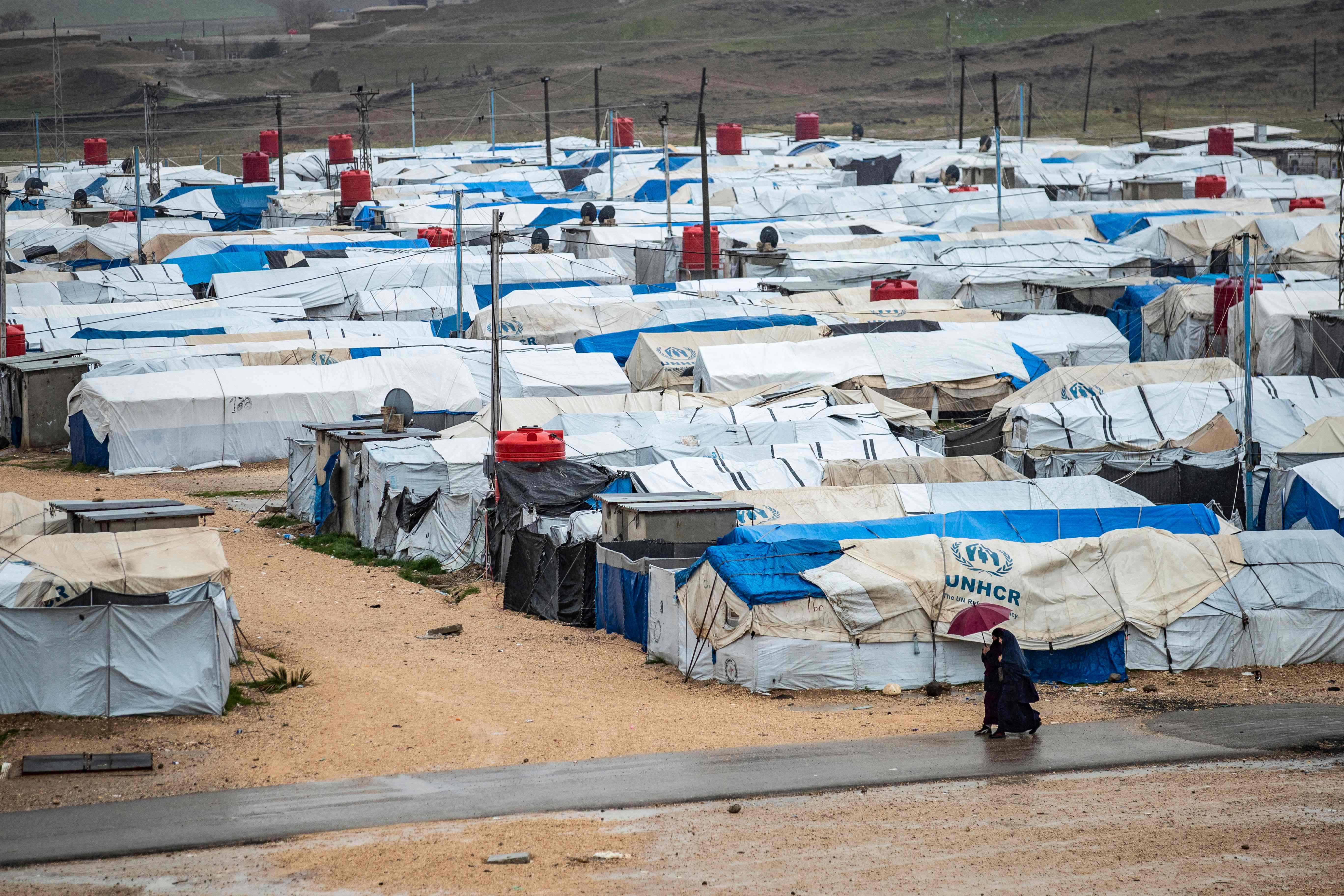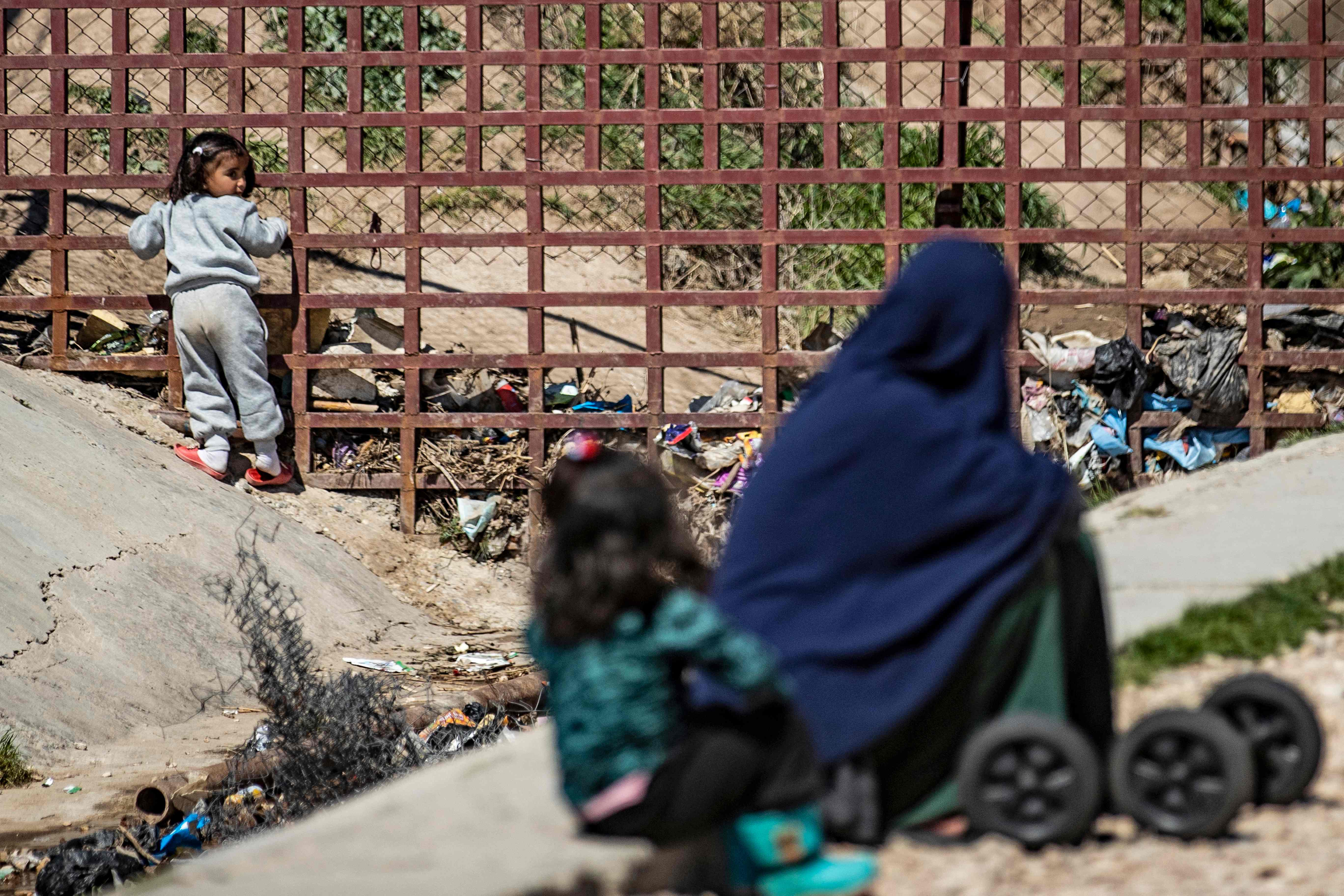UK handing ‘propaganda gift to Isis’ by refusing to repatriate detainees from Syria
MPs warn of ‘extremely serious’ security consequences if camps collapse, following major Isis assault

The government is handing a “propaganda gift to Isis” by refusing to repatriate detainees from squalid camps in Syria, a report has found.
The All-Party Parliamentary Group (APPG) on Trafficked Britons in Syria said the policy of leaving jihadis from the UK in indefinite detention was creating security risks.
“Should the detention facilities collapse, the impact on national and global security could be extremely serious,” said a report published on Thursday.
“In the meantime, the propaganda value to Isis of holding women and children in inhuman detention without charge or trial is enormous.”
The APPG said the situation was a “propaganda gift to Isis”, after receiving evidence from experts that it was using the al-Hol camp to incite supporters “almost daily”.
Isis has repeatedly called for supporters to break detainees out of prisons, and used reports of deaths and suffering in its narrative of oppression by Western countries and their allies.
The Kurdish authorities that administer the detention facilities told the APPG that the situation was “very dangerous” and called the al-Hol camp a “ticking time bomb”.
“It is unlikely to be able to hold these detainees forever,” the report said. “The UK’s closest security allies, including the US, have repeatedly called upon the UK to repatriate all of its nationals from north-east Syria in the interests of regional and global security.
“The UK government must repatriate British nationals in detention not only to ensure their safety but also our own.”
The APPG’s findings stated that the women and children being indefinitely detained may be trafficked by Isis, and any mass escapes could “fuel a resurgence of violence and terrorism in the region”.
Last month, launched a sophisticated attack on a prison for male alleged Isis members in Hasakah, resulting in a days-long battle with Kurdish forces.

An estimated 500 people died - mostly Isis members according to the Syrian Democratic forces - and an unknown number of jihadis escaped. Prisoners told relatives several child inmates had been killed.
Conservative MP Andrew Mitchell, co-chair of the APPG, said: “The government’s approach to British nationals detained in Syria is morally reprehensible, legally dubious and utterly negligent from a security perspective.
“It is also unsustainable, as a recent Isis attack on a Kurdish detention facility has shown.”
The report also found that many of the alleged Isis members “abandoned” by the government may originally have been trafficked to Isis territories, or within the former “caliphate”.
“The evidence seen by the APPG illustrates the ways in which British girls and women in particular were taken to Syria by coercive means and were subjected to sexual exploitation, forced marriage, and other forms of exploitation,” it said.
“The UK government failed to take necessary steps to prevent the trafficking of vulnerable British nationals by Isis … it has failed to provide victims with the support and protection to which they are entitled under British law.”
While refusing to repatriate jihadis from Syrian camps and prisons, the government has stripped many of their British citizenship in an effort to prevent them returning to the UK.
The APPG said the policy was racially discriminatory and “simply shifts responsibility for the issue onto other countries who may be less well equipped to manage it”.
After losing a legal challenge brought by a female alleged Isis member, the government is using the Nationality and Borders Bill to change the law so it does not have to give notice to people being deprived of their British citizenship.
Timeline of the Isis caliphate
Show all 19The APPG said it was concerned about the proposals, and that the refusal to put alleged terrorists on trial in Britain was “fostering impunity for crimes committed by Isis”.
MPs said the UK was increasingly becoming an “outlier” among international allies, after a UN inquiry found that at least 322 children and 56 women have so far been repatriated to 13 different home countries.
The US Coordinator for Counterterrorism and Special Envoy for the Defeat ISIS Coalition, John Godfrey, told the APPG that citizenship stripping “defers the problem and puts the burden on local partners”.
He added: “The US government urges countries of origin to repatriate, reintegrate and, where appropriate, prosecute and incarcerate foreign fighters and their family members.”
The Autonomous Administration of North and East Syria (AANES), which runs the camps, told the inquiry that it is “ready to provide unconditional assistance and cooperation with the UK to hand over its citizens” if it receives an official request.
The Roj and al-Hol camps are currently holding around 60,000 people, including 40,000 children, in “dire” conditions where violence, deadly fires and illness have claimed at least 163 lives, the report added.
APPG co-chair Lord Jay said: “It is vital that we learn from the failure of UK public bodies to prevent Isis from trafficking British women and girls.
“But rather than seek to understand how things went so badly wrong, the Government is doubling down on these failed policies by stripping potential trafficking victims of citizenship. A complete change of course is needed, beginning with the repatriation of all British families detained in north-east Syria.”
The government said it was seeking to facilitate the return of British orphans and unaccompanied minors “where feasible”, but not their parents.
A spokesperson added: “Our priority is to ensure the safety and security of the UK. Those who remain in the conflict zone include some of the most dangerous individuals, choosing to stay to fight or otherwise support Isis.”
The government said it was aware of security and safety difficulties in the camps but said the conditions were “ultimately the responsibility of the camp authorities,” adding: “We continue to work with international partners to support camps in Syria, funding the provision of life-saving supplies including food, water, healthcare and shelter.”
Subscribe to Independent Premium to bookmark this article
Want to bookmark your favourite articles and stories to read or reference later? Start your Independent Premium subscription today.




Join our commenting forum
Join thought-provoking conversations, follow other Independent readers and see their replies
Comments